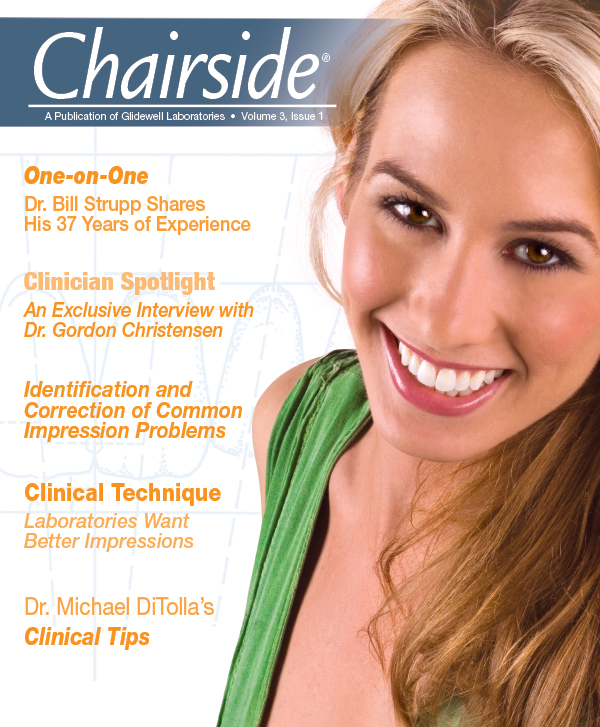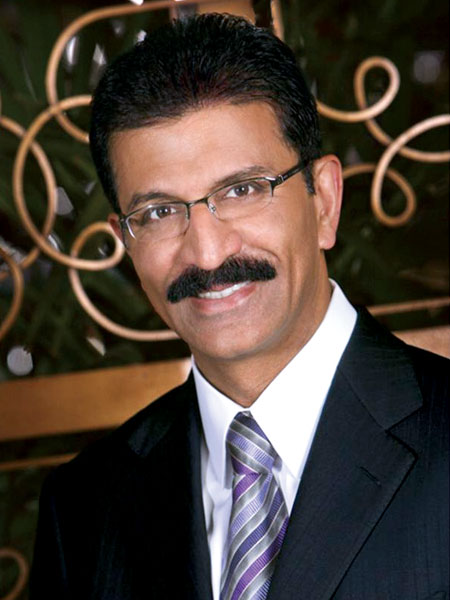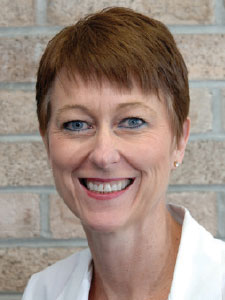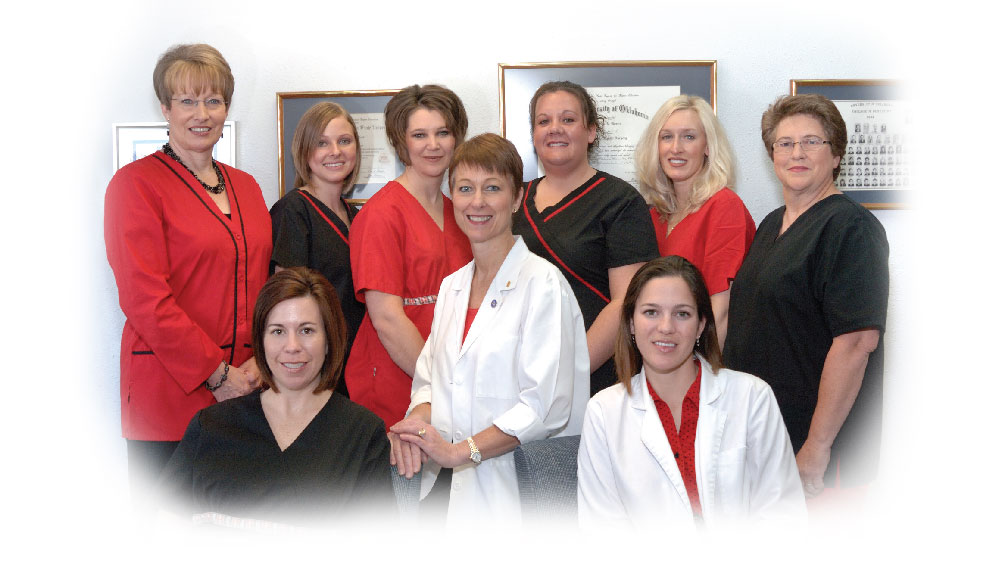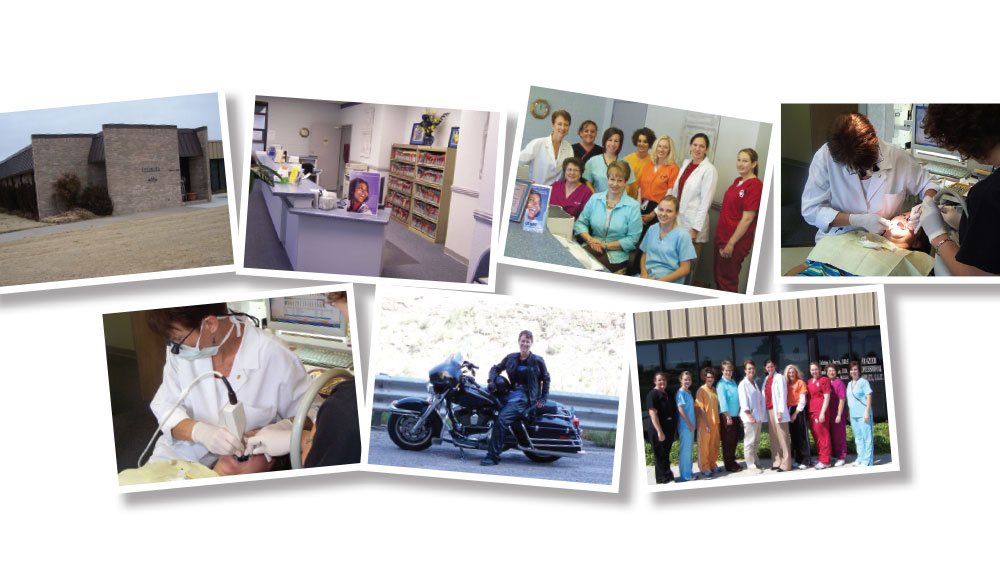Big Time Dentistry in a Small Town – An Interview with Dr. Kristen Burris
Dr. Kristen Burris practices general dentistry in the small town of Shattuck, Oklahoma, where she is the sole dental provider for 1,200 residents.
Dr. Burris embraces the opportunities practicing in a small town has provided her, and over her career has “done it all,” from full-mouth reconstructive cases to orthodontics, extractions and dentures. Her patients are like family and she sees dentistry as a way to give back to the community that she calls home. Over the years, however, even the most out-of-the-ordinary cases began to feel mundane, and Dr. Burris was feeling bored and uninspired about her profession. She wanted to have the same spark she had when she started her career, but didn’t know how to reignite the fire. On the advice of her dental supply rep, Dr. Burris attended Mercer’s (the term Mercer refers to Mercer Advisors, Mercer Mastery and/or Mercer Transitions) two-hour Value-Optimized Practice lecture in Oklahoma City. “It was as if they described my exact situation. I was in a rut,” recalls the doctor. “My practice was doing fine for a small town, but I wasn’t enjoying coming to work anymore and felt overwhelmed meeting the demands of practice ownership.” Dr. Burris attended Mercer Mastery’s two-and-a-half day Transitions workshop to learn more about how she could harness the practice’s value and learn to love her profession again. The result? After making some changes in her practice that were aligned with her philosophy of patient care, and seeking the advice of professionals at Mercer, today Dr. Burris loves dentistry and life more than ever.
Imtiaz Manji: Being the sole practitioner for 1,200 residents sounds like an awesome responsibility. What are the demands of practice ownership like in a small town?
Dr. Kristen Burris: It’s been an interesting experience, that’s for sure! I practice in an extremely rural town where the residents are primarily ranchers and farmers. There’s no stoplight in our county, so this is the real deal! With the nearest “big” town, Oklahoma City, nearly three hours away, I’m the primary dental provider for the 1,200 residents of Shattuck, as well as many patients in the Texas and the Oklahoma panhandles. In fact, I’d say that 50% of my patients come outside of Ellis County. It’s given me the opportunity to dip my hands into a lot of things that I would have otherwise never done. I guess you could say I’ve seen and done a lot.
IM: What an amazing cross-section of dentistry you’ve been able to experience! After years of practicing this way, what changed for you?
KB: I have probably have more variety in my practice than most dentists, but after a while, even the most out-of-the-ordinary cases seemed mundane. It’s hard to explain, but even if every day in the practice is different, that becomes your routine. And any routine gets old at some point.
IM: Were there any financial aspects that you felt were holding your practice back?
KB: I was doing well for a small-town practice, producing an average of $68,500 a month, but the workload was starting to weigh me down. I put a lot of pressure on myself to serve my clients the absolute best that I can, and I was struggling to do this as a one-doctor practice. I knew that I had a hygiene gap, for example, but had no idea how to close it. I used to feel I was in control of my practice, but realized that it had taken over control of me.
IM: So what was the defining moment for you? When did you realize you wanted to make a change?
KB: I attended a Mercer lecture in Oklahoma City called The Value Optimized Practice, and everything I heard seemed to describe my situation: saturated practice, midcareer blahs, and the need for an additional doctor in the practice — this was me! So I decided at that moment I need to take charge of my situation and I registered for the Transitions workshop at the Scottsdale Center for Dentistry to understand more about my options.
The workshop was a huge eye-opener. It made me stop and think about the way I wanted my life to be. I think it may have been the first time in a long time that I realized I had choices about dentistry. Choices about how and when I practiced, and that even though I was a “one-woman show,” I didn’t have to tough it out alone. I realized that with help from a team of professionals, it would be possible to fall in love with my practice again.
I also realized how important it is to integrate the different aspects of your life — your personal, practice and professional lives do not exist in a vacuum. If you have a bad day at the practice, you can’t help but take that home with you. And likewise, if you’re having a stressful time at home, that definitely affects how you feel at work. It’s too easy to think about work and home as separate things, but the reality is we’re human, and we can’t just turn off one part of our lives because it’s convenient.
IM: What specific action did you take to get your life and your practice back on track?
KB: I engaged Mercer on the practice consulting side to help get my practice operating more effectively and profitably; I also enrolled in the Economic Freedom Program to get total clarity on our personal economics, and sought Mercer’s help to find my associate and, eventually, to handle my transition. I admit I was nervous at first about bringing a consultant into my practice. I’m not a money-driven person, never have been and never will be, and I didn’t want the basis for changes in my practice to stem from monetary reasons. But, my consultant quickly eased my concerns about this and showed me that the root of the best changes are always those that act in the best interest of the patient. When you take care of the patient first, the money aspect falls into place.
IM: It sounds like you have a very enlightened vision for patient care.
KB: Well, you must understand that in a small town, there’s lot of trust among the residents. I have a 90% case acceptance rate in my practice, which I’ve been told is high, but in a town like this, when I recommend treatment to a patient, they know I’m recommending it because it’s in their best interest. There’s no reason they need to have any doubts. I don’t have to sell dentistry.
Because I’m the only dentist in Ellis County, I have a responsibility to take care of the residents who live here — sometimes regardless as to whether I’ll get paid. I do Medicaid cases, emergency care at the hospital, etc. However, I’ve never looked at this aspect of my profession as an obligation or duty. I believe the services I offer as a dentist are a gift, and it really is a joy to be able to give back.
IM: What kind of changes have you implemented in your practice since you started working with your practice consultant?
KB: It’s been great to have an outside perspective. As dentists, our worlds revolve around the next perio check and hygiene appointments. Even when we make time to work “on” our businesses, it’s hard to look at the business of the practice objectively when you’re “in” it every day.
Since we started working with our practice consultant, we have doubled our monthly production! Our goal was to hit $1 million by the end of the year, and we were proud to reach that goal by October. It’s given us a tremendous opportunity to invest back into the practice.
Our goal was to hit $1 million by the end of the year, and we were proud to reach that goal by October.
It’s been incredible. It’s amazing how the little things — tracking case acceptance, for example, and doing a morning huddle with the team in the right way — can spark really big changes in the practice. Each visit with our consultant is like a building block. We look at the progress we’ve made…and then get our next assignment! Recently, we’ve started working on patient retention and I’m excited to see how this will pay off.
IM: What type of investments have you made in your facility?
KB: We’ve added a couple of operatories to accommodate Dr. Cameron, our new associate who started in July, but most of the investment has been in equipment and technology. I’d just converted all rooms to chairside with digital when I attended Transitions, and shortly afterward I purchased a CEREC®. I also recently added CAESY® patient education, which I’m really excited about.
IM: Sounds like you’ve invested quite a bit of money! What gave you the confidence to do this?
KB: These were some pretty significant investments, which I probably would not have been comfortable with several years ago. But I look at this now as an investment in my growth, which is going to help me have more choices and freedom down the road. With the production improvements my consultant has helped us achieve, combined with the clarity I now have around my personal economics as a result of our Economic Freedom planning, spending money on the practice is an easy decision to make.
In fact, I’ve reinvested most of the production improvements right back into the practice, leaving my income the same. I am, however, now taking 10% of my income and putting that into my retirement account. By spending in the right order, I’ve also freed up some discretionary income to indulge in some things I’ve been working for a long time — including a 2005 Harley Electra Glide Police Bike!
I’ve also freed up some discretionary income to indulge in some things I’ve been working for a long time — including a 2005 Harley Electra Glide Police Bike!
IM: Tell me about your transition and associate.
KB: When I first attended Transitions I had an associate in mind who was going to be graduating dental school the following summer. In January, I attended Transitions again, this time at the newly opened Scottsdale Center for Dentistry, and with my associate-to-be, Dr. Cameron. We worked with our Mercer Transitions Leader to ensure things went smoothly when Dr. Cameron started work in July. We are still in the process of getting Dr. Cameron up and running, and I have already started to look ahead to see how we might benefit from a second associate down the road.
IM: Given your new clarity around life planning, what other things are you doing to celebrate your life and team?
KB: As a reward for hitting the $1 million mark three months earlier than expected, I took my team on a surprise trip for the weekend. I told them to come to work on Friday with a packed bag — and a sense of adventure! We drove to Amarillo, Texas, where we had dinner that night at a nice steakhouse.
On Saturday, I gave each of my team members two envelopes with cash and instructions to spend one on themselves and the other on a Secret Santa-like gift exchange for one of their team members. We were all treated to manicures and pedicures, and a fabulous home-style meal at my parents’ house in Amarillo. That evening, we celebrated our success as a team by having dinner and a gift “show and tell.”
Really, it has all just come together so powerfully for me. To be able to have a vision for all aspects of my life is incredible, and my only regret is that I didn’t start with Mercer sooner!
IM: We hear that from so many clients! Tell me about your son’s involvement with Mercer Mastery’s Young & Motivated program and how he’s getting a jump start on learning many of life’s lessons at an early age.
KB: When I went to the first Transitions I learned about the Young & Motivated workshop for young adults. I called my son and asked him, “How would you like to go to Las Vegas next month?” What college kid can turn that down?
Dan (my son) “majored in frat life” his first year of college and had struggled ever since. I always knew in my heart that he would succeed if he found something he was passionate about. Like so many kids, I think Dan felt a lot of pressure to go into a traditional profession, and be a doctor, lawyer, etc. Young & Motivated helps kids realize they can be anything they want to be. There are many paths to success in life and the one that’s right for you isn’t necessarily the one that the rest of your classmates take. To make a long story short, Dan has attended Young & Motivated twice — the second time declaring that he wanted to pursue a career in forensics and is now studying criminal psychology. Last semester he made a 3.9 GPA. He will soon be getting his master’s in forensic science.
I believe in the program so much that I have decided to sponsor one of Shattuck High School’s graduating seniors each year.
IM: That’s wonderful. So, now that things have fallen into place for you, what are you doing to keep your passion for dentistry alive?
KB: When I was at the Scottsdale Center for some advanced CEREC training, I learned about the Gordon Christensen Mentorship Program. After so many years in practice, and so many years out of school, it’s going to be great to really go deep with my clinical knowledge again. It will be different for me to take time away from the practice for 10 two-day sessions over the next couple of years, but I know it will be enormously worthwhile.
IM: Speaking of time off, do you see yourself taking some more personal time as your new associate ramps up?
KB: Well, I’ve only taken two one-week vacations in my entire career. Once was my honeymoon (laughs) and once was for a CE class that I took in England. So, yes, I probably will try to take some more time for myself, but maybe not in the same way that other people might. I’d like to go to Ireland with my son in the next few years.
My husband and I are planning to spend the weekends in Scottsdale before my Mentorship classes at the Scottsdale Center for Dentistry — kind of like a working vacation. But the reality is, I’m a homebody — always have been, always will be. Bob and I have everything we want — a beautiful ranch with cattle, horses and dogs, each other’s company — what more can you want? Mercer has taught me how important these simple gifts are and I feel blessed to be able to take advantage of all life has to offer.
IM: Sounds like a wonderful and balanced lifestyle. Thanks for sharing your story with us, Dr. Burris.
For more information about Mercer Advisors, Mercer Mastery & Mercer Transitions, go to merceradvisors.com. For more information about the Scottsdale Center for Dentistry, visit scottsdalecenter.com or call 866-781-0072. To contact Imtiaz Manji directly, email Imtiaz.manji@merceradvisors.com.
CEREC is a registered trademark of Sirona Dental Systems, Inc. (Charlotte, N.C.).
CAESY is a registered trademark of CAESY Education Systems, Inc., a Patterson Dental Company (Mendota Heights, Minn.).

